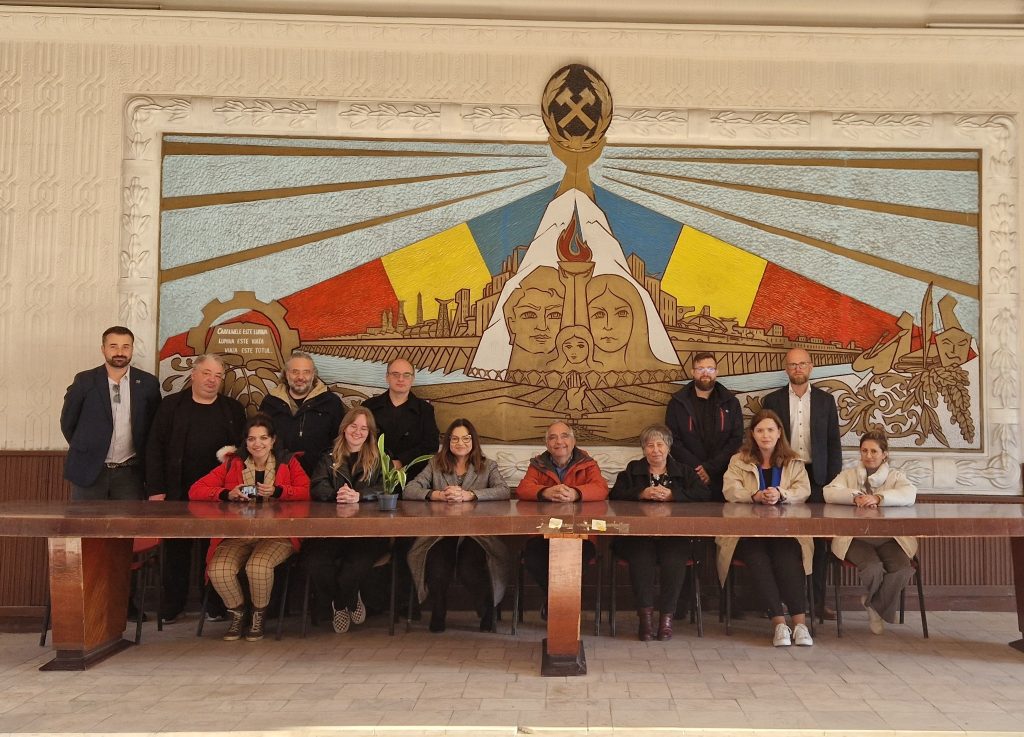HI-EURECA-PRO 2nd Project Meeting in Petroșani, 22-23 October 2024
The HI-EURECA-PRO 2nd Project Meeting was successfully held in Petroșani, Romania, on the 22nd and 23rd of October 2024, hosted at the University of Petroşani campus. The Project’s Consortium partners met in person, to monitor the project’s progress against its first semester objectives as well as establish the upcoming period’s action plan. The works focused on:
- The Demonstration Sites action plans and contributions by non-widening partner universities as well as synergies with EURECA-PRO 2.0 and RE-EURECA-PRO.
- The development of support tools for the Demonstration Sites on empowering research and innovation in sustainable heritage, building capacity on knowledge transfer, valorisation and international research collaboration.
Partners reaffirmed their dedication to delivering impactful outcomes and outlined clear pathways for executing the designated project activities effectively.
The day before the official launch of the meeting began with a formal session between the delegation from the Technical University of Crete and the leadership of Universitatea din Petroșani. Attendees included Rector Prof. Radu Sorin Mihai, Vice Rector for European Projects, Economic Environment, University Promotion, and Admissions Prof. Dan Codruț Petrilean, and Vice Rector for Scientific Research and International Relations Prof. Maria Lazăr. Then a visit was conducted at the National Institute for Research and Development in Mine Safety and Explosion Protection (INSEMEX), which included a demonstration also at the explosives testing area.
The first day of the project meeting was inaugurated with welcome addresses from Prof. Theocharis Tsoutsos, Project Coordinator from the Renewable and Sustainable Energy Lab at the Technical University of Crete (ReSEL@TUC) and Dr. Sabin Ioan Irimie, from the Department of Management and Industrial Engineering at the University of Petroșani, who both extended a warm welcome to participants and set the tone for the day’s events.
Stavroula Tournaki, the Lead of the European Projects Team of ReSEL TUC, presented the Meeting’s Progress and Objectives, passing on the torch at a workshop dedicated to the introduction to the HI-EURECA-PRO demonstration sites, each uniquely structured to highlight diverse aspects of heritage and innovation.
The Industrial Heritage Demo Site located in Silesia, Poland, was introduced by Prof. Szymon Ogonowski, from the Silesian University of Technology. This site is pivotal in exploring the intersection of industrial heritage and modern innovation. Prof. Szymon Ogonowski presented a comprehensive plan for the initial reporting period, focusing on several key initiatives designed to promote digital transformation and collaborative research. These initiatives are aimed at enhancing knowledge, skills, and infrastructure in the field of industrial heritage
A detailed plan for the first reporting period concerning the Cultural Heritage Demo Site in Crete, Greece, was presented by Prof. Theocharis Tsoutsos, focusing on several key initiatives aimed at enhancing material sustainability in cultural heritage, upskilling staff, and promoting international cooperation in green transition practices.
Dr. Sabin Ioan Irimie from Universitatea din Petroșani presented the detailed plan for the 1st reporting period of the Mining Heritage Demo Site in the Jiu Liu Valley, Petroșani, Romania. This initiative aims to become a beacon of heritage preservation and sustainable development by intertwining the rich history of mining with contemporary themes of transition, circularity, and sustainability. The plan includes key components such as the Digital Museum, Research Project Office, workshops, community mapping, and policy guidelines.
After the presentation of the demo sites’ action plan, Dr. Apostolos Gerontas from TU Bergakademie Freiberg elaborated on the essential aspects of evaluating, assessing, and monitoring demo sites His presentation delved into the approach, methodology, criteria, action plan, and the forthcoming steps for the project, with a comprehensive discussion involving all stakeholders.
The day concluded with the visits to Petrila Mine, which is closed and revived through art, and at the Mining Museum of Petroșani.
The second and final day of the meeting started with a visit to the underground of the Livezeni Mine, an operational mining site. Following this study visit, the closing meeting sessions focused on various aspects of research and innovation for sustainable heritage and collaboration.
Prof. María Fernández Raga, from the Universidad de León focused on updating curricula (Deliverable 10.2) and developing support tools for demonstration sites. The progress made was presented, and the next steps in empowering research and innovation were outlined. A discussion engaging all the participants followed the presentation, allowing for input and feedback.
Then, the methods and the initial action plan for Capacity Building for International Research Collaboration (WP13), presented by Aga Kosciuszko, from the Montanuniversität Leobenin, through which tools and good practices emerge, particularly for Widening countries and support for the demo sites.
Anneke Kenens, from Hasselt University, presented findings on a survey performed at widening universities at demonstration sites, aiming to map existing knowledge transfer and valorisation structures in the widening countries (Poland, Greece, Romania).
Prof. Dr. Gunter Süß, Hochschule Mittweida, and Dr. Sabin Ioan Irimie, Universitatea din Petroșani cooperated in a session addressing progress and future steps in communication and dissemination, which covered the project’s website, social media strategy, and the action plan for dissemination, communication, and exploitation.
The meeting concluded with a wrap-up session, from Stavroula Tournaki and Maria Frangou (ReSEL@TUC), focusing on project management and outlining the next steps. This provided a comprehensive overview of the progress made during the meeting and set the stage for future activities.
The meeting successfully evaluated the project’s progress against its first semester objectives and laid the groundwork for the next phase. The partners collectively showcased a firm dedication to delivering impactful outcomes by establishing clear pathways for executing the designated project activities effectively. Beyond the formal meeting agenda, partners experienced the warm and generous Romanian hospitality and participated in a diverse program of activities showcasing the region’s rich industrial heritage. As the project moves forward, the collaborative spirit and clear action plans established in Petroșani will further contribute to the consortium’s guidance towards achieving the HI-EURECA-PRO project’s ambitious goals.
LEARN. CONNECT. INSPIRE.
Follow HI-EURECA -PRO and enjoy benefits.
Lorem ipsum dolor sit amet, consectetur adipiscing elit. Ut elit tellus, luctus nec ullamcorper mattis, pulvinar dapibus leo.

